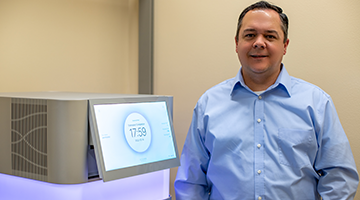Disease Monitoring

Joshua Featherston, Missouri State Public Health Laboratory
Manager of the MSPHL Molecular Unit
Disease Monitoring
Disease monitoring enhanced
Impact: statewide
Disease Monitoring
Disease monitoring enhanced: the Missouri State Public Health Laboratory upgraded equipment and began partnering with the University of Missouri to expand bioinformatics services
Disease data can tell a story. That story can help us predict how viruses are moving through our communities. Prior to the COVID-19 pandemic, that capability was only needed in a limited capacity. The quickly mutating SARS-CoV-2 virus meant that accurate tracking of new variants was a must; however, the infrastructure and data processing required to do that didn’t exist at the Missouri State Public Health Laboratory (MSPHL).
"By sequencing all these COVID viruses or specimens that come in, we are able to track the progress of the virus across the state," Joshua Featherston, molecular unit manager for the MSPHL, said. "It also allows for us to tell what variants are circulating."
The MSPHL received funding to purchase new equipment and partner with the University of Missouri Bioinformatics Core for the development of an infrastructure for Missouri. This agreement will allow MU to provide state-of-the-art bioinformatics services to Missourians through the MSPHL.
MU’s role with this partnership will allow their team to analyze the de-identified data and provide an in-depth review of the information that is collected.

Featherston explains that bioinformatics testing is both extensive and expensive.
"Sequencing analysis is very difficult to perform," said Featherston. "It requires very specialized instrumentation and computers, as well as a very strong understanding of bioinformatics."
"Utilizing the expertise of the University of Missouri’s Bioinformatics Core in combination with our new equipment, we’re able to track things in real time as they develop," Featherston continued. "Now that this partnership has been formed, we can use these resources for other things, such as tuberculosis or enhanced tracking of E.coli. The possibilities are endless with what we can do with this partnership."
The newly-forged partnership between DHSS & MU will allow for the rapid expansion of disease monitoring throughout the state for multiple viruses and bacteria, which will assist the State of Missouri in our efforts to contain outbreaks more rapidly.
The team also secured the funding for additional equipment and reagents to increase capacity significantly. For example, three new extraction machines means the laboratory can separate COVID-19 specimens at the rate of 288 specimens every 24 minutes, or 720 specimens every hour. The previous extraction capability was only 12 specimens per hour.
"With our new equipment, we will be able to rapidly respond to an outbreak," said Featherston. "We will be able to test for multiple outbreaks at the same time."
These resources obtained by MSPHL are affecting the residents of Missouri in many positive ways. The equipment is allowing for tracking of variants, and even subvariants of viruses, to know what is circulating in Missouri and how the State of Missouri reacts in future outbreaks.
